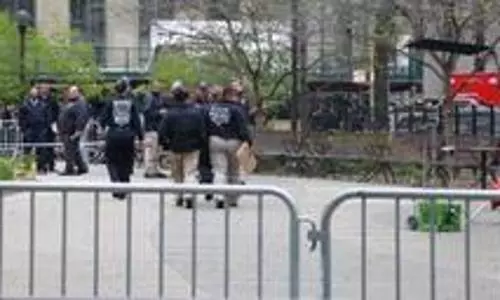
Scattershot Diplomacy
text_fieldsDiplomacy lies in the skill of the heads of states to mitigate contradictions in international affairs. It involves mutual acceptance and offers of concessions. But, what shall we call it, if the diplomacy is used to aggravate differences and excite the contradictions? They consider it their skill and excellence. This is what the Iranian President Hassan Rouhani has ridiculed, “it is only childish.”
Trump administration made a last minute attempt to continue the detention of the Iranian container vessel ‘Grace-1' held in Gibraltar from 4th July. Iran’s Revolutionary Guards seized Stena Impero, the British flagged ship, on 19th July as a tit-for-tat tactic. Boris Johnson, the British Prime Minister and personal friend of Donald Trump should not have released the vessel if he could withstand the international pressure and the legal obligations. The last minute attempt by the US government became futile as the supreme court in the British territory of Gibraltar approved its release stating that the American blockade was not applicable to the European Union countries. This was actually on considering the escalating tension in the Mediterranean Sea and in the Strait of Hormuz. Britain wants to continue its marine trade in these waters. Hence, a compromise with Iran was in their interest.
Now, Grace-1 has left Gibraltar, changing the name to Adrian Darya-1, though ‘Stena Impero’ is still in the custody of Iran. The ship headed for Kalamata, in Greece has changed its course and is moving towards Mercin, the port of Turkey. Still its actual destination remains a mystery as the US has issued a warning to counties against permitting the Adrian Darya-1 to be anchored in their ports.
Tension has been building up between Iran and the US since Donald Trump withdrew from the nuclear deal that was negotiated by Obama administration with the superpowers in 2015. Donald Trump’s administration reintroduced economic sanctions to strangle the Iranian economy. Recently, in May 2019, America sent aircraft carriers and bombers to the Middle East and evacuated diplomatic personnel from Iraq and nearby places around Iran. The US alleged that Iran had perpetrated damages to the oil tankers bearing Saudi flag, Norway and the United Arab Emirates (UAE). And the National Security Adviser John Bolton repeatedly warned that any threat from Iran or from its proxies would be dealt with by military attack. Thus, there spread the dark clouds of war. Every one thought that war was imminent. However, Iran kept the conflict at a low boil to avoid direct military confrontation as far as possible.
It was during this time that the US central command which oversees the military operations in the Middle East sent a high-altitude ‘Global Hawk' drone into the airspace over Hormuz. It happened on 20th of June, after midnight. The Iranian Revolutionary Guards noted that the drone was moving from above the Strait of Hormuz towards the city of Chabahar, in the South East of Iran. Iran immediately shot down the drone. The Head of the Revolutionary Guard Corps Major General Hussein Salami stated that it was a warning to the US and he commented “the only way for our enemies to be safe is to respect our sovereignty, national security and the national interests of the great Iranian nation.”
The background abovewas the trigger for Mohammed Javad Zarif ,the Iranian foreign minister, to give an interview to the media in New York, after the United Nations Conference. Washington blamed that the Iranian foreign minister was misleading the American public opinion. Immediately afterwards, Trump administration imposed sanctions against Javad Zarif. He had unusual restrictions on his movements in New York. Further, it blocked or financial interests and property, if he had any, in the US. Naturally, Javad Zarif downplayed the issue as he has no property in the US norany financial interests there. It was Zarif who played a creative role in shaping the nuclear deal in 2015 when Obama administration negotiated with the world powers. President Hassan Rouhani asks America, “what happened to your claims of liberty, freedom of expression and Democracy?.” The European Union leaders still say that they would talk to Zarif, “We will continue to work with Javad Zarif, a top diplomat in Iran and taking into account of keeping the diplomatic channels open,” European Commission spokesman Carlos Martin said. The UK hopes to advance peace in an upcoming meeting. Britain’s mMddle East minister Andrew Morrison has now visited Iran. It is stated that this is to “further open a frank and constructive engagement with the government of Iran.” France, Germany and the UK have been trying to salvage the 2015 nuclear deal despite the withdrawal of the US from it. Iran has been trying to get an economic package from its counterparts in the deal to offset the sanctions from the US government.
Iran has responded in recent weeks by reducing its compliance with the deal. Hence, all eyes are on Europe. Europe has to work to prevent the complete collapse of the deal. As French President Emanuel Macron suggested, some one has to come forward with a diplomatic solution before the UN Assembly ,taking place in September, in order to counter the reverse move from Iran. But, European governments are unable to provide a framework in which their companies could trade with Iran ignoring the penalties from the Trump administration.
Trump’s policy towards Iran is one befitting a political novice - self contradictory and scattershot. One part of his administration headed by John Bolton and Pompeo seeks the collapse of JCPOA while the pro-deal Camp remains in the treasury benches. Treasury Secretary Steve Mnuchin is one among them. They are pushing the message of diplomacy, not war. Trump seems to have two camps that are hard to reconcile. The recent incidents over Hormuz indicate that Iran is well aware of Trump’s dilemma. This has abetted Iran to sabotage the oil tankers with Saudi flag, to seize the British-flagged tanker and to shoot down the US military drone over Hormuz. But, Iran is too cautious so as not to intimidate the pro-deal Republican senators. This Iranian strategy has further complicated the US move in the Middle East. This is evident from the dramatic reversal of Trump’s decision to retaliate after the drone incident. At the same time, Trump wants to appear tough before the hawks - especially the Israeli lobby – like Mike Pompeo and John Bolton by introducing more rigid economic sanctions against Iran. Hence, the diplomacy of the Trump administration is vacillating.
It would be apalling to think about the world peace if Netanyahu wins the coming election in Israel and Donald Trump is re-elected American President. At Biarritz, in France, after G-7 summit, Trump said that he has second thoughts on everything. He was referring to the regime change in Iran and the trade war with China. He repeated that the US is not thinking about a regime change in Iran. It seemed that the G-7 participants were influencing his views. Lack of experience and novice-like behaviour make Donald Trump, in any way, unpredictable.























